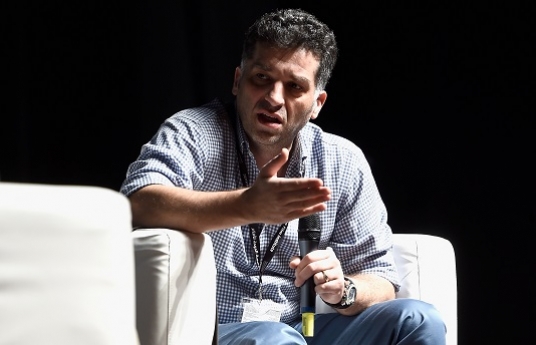Danis Tanović discusses the importance of story, the human cost of war and the influence of family in first of the Qumra Masterclasses
Mar 07, 2015

Moderated by Richard Pēna, the session showed clips from Tanović’s previous films including No Man’s Land, L’Enfer and Cirkus Columbia
Doha, Qatar – 7 March, 2015: At the first master class of the inaugural edition of Qumra, Bosnian filmmaker Danis Tanović talked candidly about his life as a filmmaker, his influences and documenting the Bosnian Civil War.
As one of the Qumra Masters, Tanović will be mentoring four projects and their filmmakers at the event including director/screenwriter Shahad Ameen’s fantasy/drama Scales (Saudi Arabia, Qatar), the drama Superpower (Qatar), written by Mohamed Al Mahmeed writer/director Yahya Alabdallah’s dark comedy Me, Myself & Murdoch (Palestine, Jordan, France, Qatar) and writer/director Emin Alper’s political thriller Frenzy (Turkey, France, Qatar).
Speaking of how he became a filmmaker, Tanović said from a young age growing up in former Yugoslavia he watched films from the East and the West on TV. “Because of my dad I fell in love with Italian cinema so my history of cinema is influenced heavily by Italian cinema,” he said.
As defacto member of the armed forces in his 20s Tanović realized it was important that someone document the war and what it was really like, so when he was a film student he broke into his film school and stole two cameras.
“That’s how we started. People may despise me for it but if you are a filmmaker you need a camera! As a member of the defence forces we had total freedom to go and film whatever happened and go wherever we wanted – we were gathering material to give to journalists who couldn’t go to those places.”
With his first film No Man’s Land, which he made at age 31 after finishing film school, Tanović said the inspiration came from him not being happy about the way war had been presented in films he’d seen.
“In war the only lesson you learn is that no one wins. I don’t think you should make a war film unless you are anti-war really. I wanted to tell the story of the futility of war, about what really happens during war. It makes you realise how fragile life is and how easily it can be broken, and that the only way to survive such a terrible time is to try and find humour in it. “
The film, Tanović said was shot in 26 days with one day involving 27 setups, yet in spite of it being tough working on a small budget film and to a very tight schedule Tanović said he and the crew had a lot of fun making the film..
. “With No Man’s Land I had no fear as it was my first film and there were no investors or expectations. For me making movies is not a business, it’s more of a well paid hobby and I love it. With this film I could do anything and I learnt to go with my gut.”
On making films, Tanović said the key is “Simply story, story, story. If a screenplay is good I stick to it like a sacred book. I rarely see good films with bad screenplays. I don’t think you can make a good film out of a bad story – it’s a key element. And you have to have a feeling when you read a screenplay – if it doesn’t make you feel something it’s not a good screenplay.”
With his film An Episode in the Life of an Iron Picker, shot for Euros 17,000 in 8 days, Tanović said even though he didn’t have a screenplay he had a story that he knew he had to tell because he was angry about the injustice of the healthcare system in which a family in real need didn’t qualify for help.
“I made this film against the odds,” he said. “But I believe when you have something to say you have to just go and do it. We’d all love to have millions of dollars to make films but that doesn’t always happen.”
In terms of the impact of his films on political life in Bosnia, Tanović said he didn’t believe he was a “man with a mission” but said: “I seriously do believe that if my film changes the perception of one person somewhere and that saves the life of one person then you are doing something that makes sense.”
Winning an Academy Award, he said, has given him the freedom to remain independent. “If you can win an Oscar or a major award at a festival please do, it helps,” he joked. “You get paid more and it attracts attention. But in all seriousness, it’s important to work with people who think the way you do, who you connect with. The funny thing about being a filmmaker is that we all have different ways of thinking, filming, living. We are each a lone wolf working with our own little tribe and you have to figure out what is right for you.”
Asked about whether he would ever go into making TV, Tanović said: “Yes of course. TV is a really powerful tool. In a sense it is much more powerful than independent cinema days. The audience potential for good TV is huge and when it’s good, TV is great. My wife and look forward to watching our favourite shows in Sunday night once the children are in bed.”
Speaking about the importance of family, and how he often depicts family life in his work, Tanović said: “I think everything affects you in life. I’d say that the young part of my life was really affected by war. The latter part of my career has been affected by my wife and children. Family comes first and everything else for me, including making films comes second.”